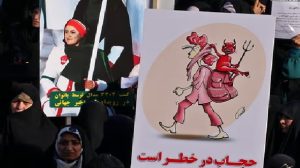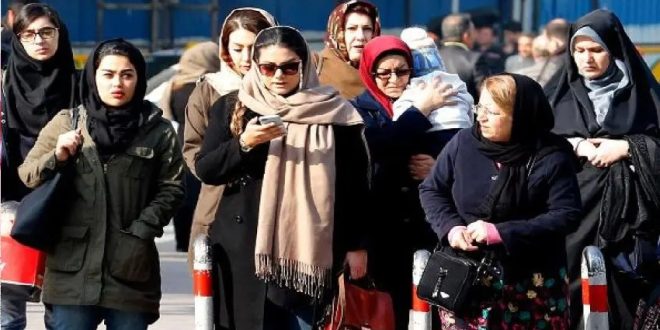14-09-2023
TEHRAN: Women in Iran face up to 10 years in prison if they continue to defy the country’s mandatory hijab law, under harsher laws awaiting approval by authorities. Even businesses that serve women without a hijab face being shut down.
 The stricter dress code, which amounts to “gender apartheid”, UN experts said, comes one year after the death in custody of Mahsa Amini, 22, who had been detained for allegedly wearing the Islamic headscarf incorrectly. Her death, after allegedly being beaten by police, led to the largest wave of popular unrest for years in Iran.
The stricter dress code, which amounts to “gender apartheid”, UN experts said, comes one year after the death in custody of Mahsa Amini, 22, who had been detained for allegedly wearing the Islamic headscarf incorrectly. Her death, after allegedly being beaten by police, led to the largest wave of popular unrest for years in Iran.
The length of prison sentences contained in the draft law was comparable to those for serious offences such as murder and drug trafficking, said an Iranian human rights lawyer, Hossein Raeesi. “That’s ridiculous to even think about.”
The hijab and chastity bill details punishments including more than 60 lashes, heavy fines and prison terms. It also warns businesses of closure and other serious consequences if found to be providing services to women with “improper dress code”.
Elnaz*, an Iranian journalist, said: “With the new law, the government is telling us women that we will go to prison for up to 10 years if we don’t wear a hijab. What next? A death penalty for defying the new hijab law?”
The draft law follows renewed patrolling by the “morality police” and widens “gender segregation” in universities,  hospitals, parks and workplaces. It amounts to an apparent attempt at “suppressing women and girls into total submission”, said a group of UN Human Rights Council-appointed experts.
hospitals, parks and workplaces. It amounts to an apparent attempt at “suppressing women and girls into total submission”, said a group of UN Human Rights Council-appointed experts.
Farah*, a finance student from Tehran, said: “The Islamic Republic has taken a cue from the Taliban to slowly ban us from public places. They want to erase women from society.”
The organization Human Rights Activists in Iran (HRA) said the new law was being reviewed by Iran’s Guardian Council, a powerful body that vets legislation and oversees elections. It comprises 12 men and is headed by a recently re-elected 97-year-old cleric, Ahmad Jannati, who has been its chair since 1988.
They are tasked with reviewing the bill’s provisions and ensuring its alignment with Islamic law. Once endorsed, the bill would return to parliament and could come into force as early as October, said the HRA.
* Names have been changed to protect identities. (Int’l News Desk)
 Pressmediaofindia
Pressmediaofindia




